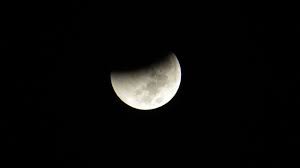SOLAR ECLIPSES
In various cultures and spiritual traditions, solar eclipses, including partial ones, are considered powerful events with deep symbolic and energetic meanings. The spiritual significance of a partial solar eclipse can be viewed through several lenses, depending on the belief system or personal spirituality.
Common Spiritual Themes of Partial Solar Eclipses:
-
Transformation and Change:
Eclipses are often seen as catalysts for transformation, signaling shifts in energy, circumstances, or personal growth. A partial solar eclipse may symbolize a period of partial revelation or gradual change, where some aspects of one's life or inner self are illuminated while others remain in shadow.
It’s a time to reflect on transitions, beginnings, and the clearing away of old energies to make way for new ones.
-
Balancing Light and Darkness:
The partial covering of the Sun by the Moon represents a balance between light (consciousness) and darkness (subconsciousness or hidden aspects). Spiritually, it can encourage self-exploration, urging individuals to face both the "seen" and "unseen" aspects of their lives.
This dynamic suggests a period of learning to embrace both the positive and negative within oneself, cultivating balance.
-
New Beginnings and Intentions:
Eclipses, particularly solar eclipses, occur during new moons, a time traditionally associated with setting intentions and new beginnings. A partial solar eclipse can intensify this energy, making it a potent time to plant the seeds for future endeavors or personal transformations.
Many see it as an opportunity to realign with their spiritual path, shed old habits, and embrace new perspectives.
-
Heightened Energy:
The alignment of the Earth, Moon, and Sun is believed to create a surge of cosmic energy. Spiritually sensitive people may feel more attuned to the subtle shifts in energy during a partial eclipse. Meditation, rituals, or energy work performed during an eclipse are often thought to be more potent.
-
Cultural and Astrological Interpretations:
In Vedic astrology, eclipses are associated with the shadow planets Rahu and Ketu, which are considered karmic nodes. A partial eclipse can be seen as a time of karmic rebalancing, when unresolved past energies come to the surface to be dealt with.
Many indigenous cultures believe that an eclipse is a time when the normal balance of the cosmos is disrupted, and it can be a powerful time for healing, cleansing, and resetting one’s spiritual energy.
-
Reflection on Hidden Truths:
Eclipses, especially partial ones, can symbolize the revelation of hidden truths or insights. The portion of the Sun that remains visible represents clarity, while the obscured part suggests that there are still mysteries to uncover. This can inspire deeper self-reflection or the uncovering of inner wisdom.
Rituals and Practices:
During a partial solar eclipse, some spiritual practitioners engage in specific rituals to harness the energy of the event:
Meditation: A time for inner reflection, connecting with the cosmic energies, and contemplating personal growth.
Journaling: Writing down thoughts, intentions, or emotional releases during the eclipse period.
Cleansing: Many believe it’s a good time for spiritual cleansing rituals, such as smudging with sage or bathing in saltwater, to clear out old energies and make way for renewal.
Setting Intentions: As it coincides with a new moon, a partial solar eclipse is ideal for setting intentions for the future, manifesting desires, or engaging in visualizations of goals.
Precautions in Some Cultures:
In certain cultures, eclipses are seen as periods of heightened cosmic imbalance. In India, for example, many observe the time of an eclipse as a moment to fast, meditate, and avoid certain activities, as the eclipse is believed to create inauspicious energies.
In summary, the spiritual aspect of a partial solar eclipse often revolves around change, balance, revelation, and new beginnings, offering an opportunity to reflect on life, embrace transformation, and connect with cosmic energies.
